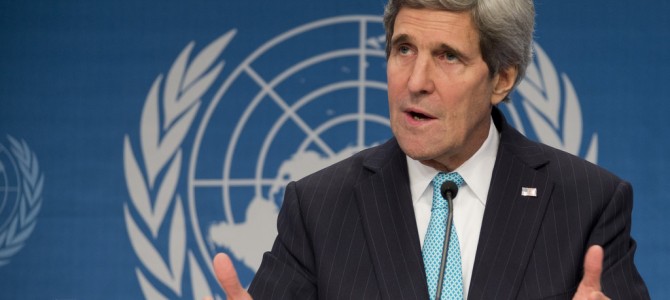
The United States went to war again some time around Constitution Day, looking nothing like the constitutional republic the framers of the Constitution hoped they had created when they attached their names to that document on September 17, 1787.
The reasons for this are perhaps as numerous as the possible starting dates for the war, but all are grounded in a disregard for deliberative government and the rule of law–the essential hallmarks of a republic.
The distribution of the Constitution’s powers and the explanation of that distribution in The Federalist suggest that there are four key steps in a republic going to war:
- a case for war presented by the president to the Congress and, by extension, the American people;
- an expression of popular support in the approval of the House of Representatives as the (most) democratic part of the government;
- wise deliberation on war ends and means, especially in the Senate, whose structure and powers (like approving treaties) were meant to promote careful and reasonable reflection;
- secrecy and dispatch in executing the resolution approved, led by the president, relevant cabinet members, and the military chain of command.
The president is the key figure at the beginning and the end, but in between, the legislative branch is meant to add “reflection” and express “choice,” in the famous words of the first Federalist essay–that is, to make the most solemn decision for the regime in a way consistent with the principles of the regime.
What we’ve seen in the last two weeks is a parody of this process. The president did speak, but he spoke to the American people, not the Congress, whose approval he claimed he did not need. Then the Administration spent two days publicly debating itself over what exactly he didn’t need approval to do–before deciding that “of course” it was war we’ve been talking about all along. Members of the House, eager to get back “home” to campaign and not at all eager to cast a controversial vote on their way to the airport, tacked a resolution supporting the arming and training of “moderate” Syrians onto a stopgap spending bill last Wednesday.
The next day, the Senate approved the House package, pushing any real deliberation on peace or war (not to mention federal spending) off for three months–until after the elections are over and the President has already made (his) war a fait accompli. All along the way, there’s been plenty of grandstanding, but no deliberating; lots of words, but few arguments.
This is the way of a hollowed-out democratic empire, not a healthy republic–where demagogues engage in political theater, while clear-sighted enemies impose on them new realities.
Last week, the former senators in the three highest positions in the US government provided an instructive if unintentional lesson in why this difference matters.
Ivy League-educated former US Senator from Massachusetts, under-the-radar adjunct professor of theology, and current Secretary of State John Kerry, offered to help Islamic peoples redefine their religion, making it more palatable to themselves and the West.
It really is that simple, isn’t it? Once we’ve got a bead on the Syrian moderates, we’ll get some Sunni and Shiite Muslims in a room, get that whole “religious foundation” thing squared away, and then “put the real Islam out there and draw lines throughout the region.”
Not to be outdone, teacher and knower of all things good, former community organizer and US Senator from Illinois, and current POTUS Barack Obama, in the spirit of Woodrow Wilson’s “I am going to teach the South American republics to elect good men,” offered ISIS a lesson on terrorism.
Whereas Machiavelli counseled, “Never do any enemy a small injury for they are like a snake which is half beaten and it will strike back the first chance,” Mr. Obama, perhaps auditioning for a future role on the TED Talk circuit, advised ISIS to insitute progressive best practices by kidnapping, releasing, and pinning notes on one’s released hostages saying “Stay out of here; this is none of your business.”
Meanwhile Vice-President Joe Biden, the Clouseau-like truth teller of the group, in perfect Joe Biden form, suggested in a meet-and-greet with nuns that our business in the region will not include “boots on the ground” until strategic failure requires “boots on the ground.” In other words, “overseas contingency operations” are made for winning only after missteps have produced predictable losses, with the caveat that one define “winning” as mutually assured stalemate.
In each of these instances, we see liberal internationalist fantasies at play, with no political course correction on the near horizon.
For John Kerry, the moral and ideational differences that divide peoples merely amount to delusional misinterpretations of religious and political principles that can be cast aside. Every religion is a Bahá’í faith waiting to be revealed, and every city of man is a city of peace waiting to be made. For Barack Obama, one overcomes the defect of better motives by conjuring up shared interests wherever imaginable. And for Joe Biden, a toothless dog is better than a dead lion.
Can anyone deliver us from this folly? Not easily, if the Senate persists in its role as the world’s least deliberative body. If it won’t debate budgets and war measures, what is it there for?
As the leading American diplomat of the day, John Jay wrote the Federalist essay on the Senate’s role in approving treaties (no. 64). He argued that because of its close connection with “war, peace, and commerce,” the power to make treaties should be delegated to those “who best understand our national interests . . . who are best able to promote those interests, and whose reputation for integrity inspires and merits confidence.”
The Senate should be filled with such leaders, Jay argued, based upon its qualifications for office, the (state legislature-based) mode by which its members are chosen, the length of their term, and their rotating system of elections. If this is the case today, the Senate is much too diffident of displaying its virtues. Let us see a chamber of presidents-in-waiting debate the why and how of our new war.
Here’s how: our mentor, distinguished scholar of foreign affairs and one-time Senate aide Dr. Angelo Codevilla, has prepared a war resolution in the sort of plain declaratives that refuse to shelter sloppy thinking or calculated equivocations. Any Senator might propose it to the body. Not one, perhaps, would wish to vote for it as written. Then let them change it, explaining their reasons why. Let us see how they understand “our national interests” and how best “to promote those interests.”
Last year, Rand Paul and Ted Cruz both reminded Americans that the Senate can be more than an elegant setting for Harry Reid’s Koch-induced temper tantrums. Senator Paul’s filibuster concerning the domestic use of drones and Senator Cruz’s speech against Obamacare drew national attention–to arguments on important policy questions.
Today, we very much need a real debate on the war with ISIS, because we very much need to win that war–in the real world.
David Corbin is a Professor of Politics and Matthew Parks an Assistant Professor of Politics at The King’s College, New York City. They are co-authors of “Keeping Our Republic: Principles for a Political Reformation” (2011). You can follow their work on Twitter or Facebook.









